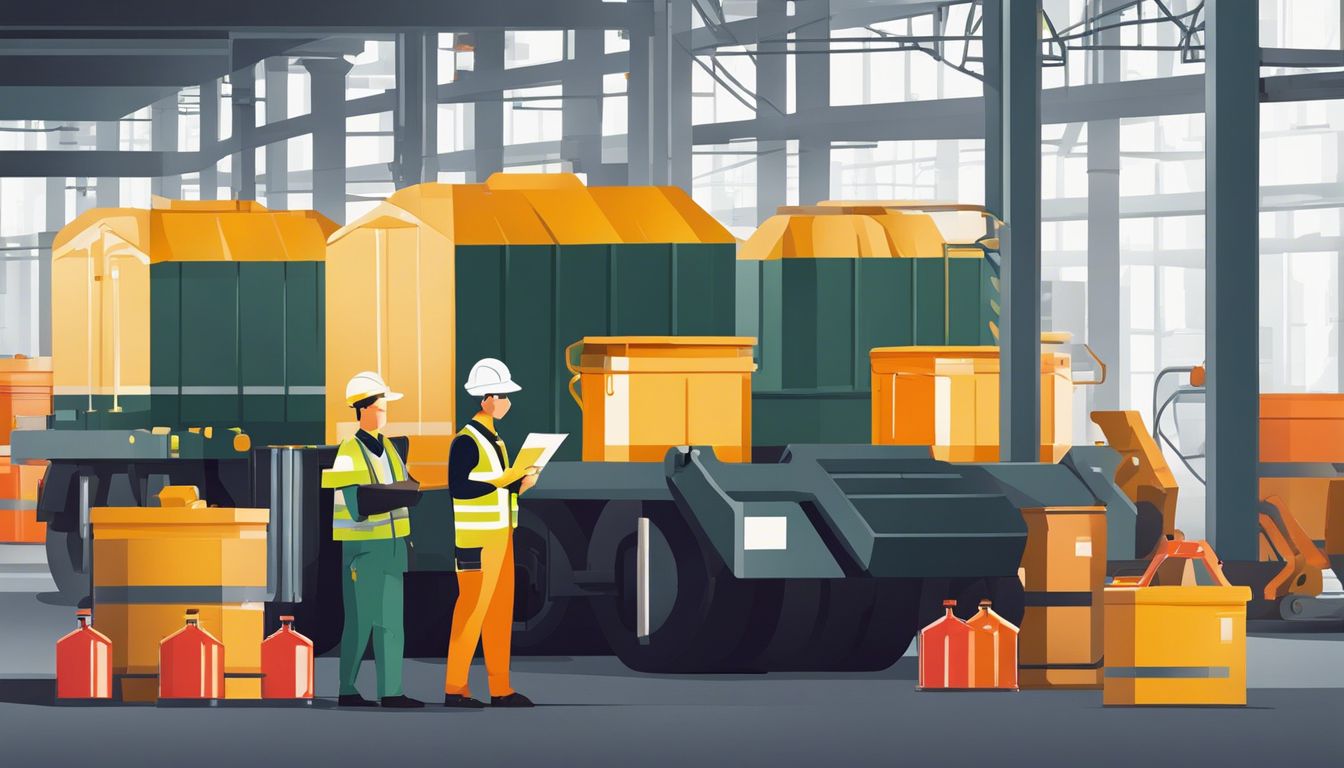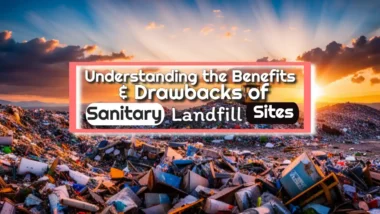Managing rubbish costs money. UK companies know this too well, as they deal with heaps of trash every day. Every year, these businesses create 27.5 million tonnes of commercial waste and 13.6 million tonnes of industrial waste – that’s a mountain weighing 41.1 million tonnes! Tossing all that waste can eat up to 4-5% of what a company earns.
Dumping trash in landfills is pricey, with each tonne costing £103.70 per tonne since April 2024! To legally get rid of the rubbish or move it around, you need a Waste Carriers Licence (WCL).
If you don’t follow the rules about waste disposal, you could face big fines and even damage your business’s name.
With so much trash coming from businesses—almost double what homes produce—it’s clear why figuring out how to handle different wastes like paper, plastic and more is crucial. The good news? With smart actions like checking how much junk you have and recycling more, companies can save cash on waste collection.
This article sheds light on keeping those pesky garbage bills low without breaking any laws. Let’s dig into what UK rubbish really costs—and learn some savvy ways to trim those expenses!
Key Takeaways
- UK businesses produce over 27 million tonnes of commercial waste annually, leading to significant disposal costs.
- Costs vary based on factors like bin hire, type of waste, weight, and frequency of collection—businesses can pay between £5 and £20 per week for bin hires and up to £200 per tonne for excess weight fees.
- Landfill taxes (including inert waste landfill taxes) increase each year; the current rate is £96.70 per tonne for general waste. Reducing, reusing, and recycling can lower these expenses.
- Having a Waste Carriers Licence is essential—it’s free for Lower Tier but the Upper Tier Licence costs from £154 to £216 annually. Not having one can lead to serious fines.
- Smart strategies like auditing waste, boosting recycling efforts, optimising purchases, fostering sustainability at work, reviewing service providers regularly and considering compaction or partnerships with other companies can help reduce costs effectively.
The Real Cost of Commercial Waste Disposal in the UK

As businesses across the UK strive for sustainability, understanding the true expense of commercial waste disposal becomes vital. It’s not just the visible bills that add up; from landfill taxes to hidden overheads, we’ll dissect what your rubbish is really costing you.
Commercial Waste Collection Costs
Understanding the financials involved in commercial waste collection is key for UK businesses aiming to keep expenses in check. The numbers can vary depending on several factors including the size of the business, frequency of collection, and types of waste.
| Cost Factor | Description | Typical Cost Range |
|---|---|---|
| Bin Rental | Rental fee for waste containers | £5 – £20 per week |
| Collection Fee | Charge for each waste collection service | £10 – £40 per collection |
| Waste Type Surcharge | Additional costs for certain waste types (e.g., hazardous) | Varies widely |
| Excess Weight Fee | Charges for waste exceeding weight limits | £50 – £200 per tonne |
| Licence Fee | Annual Waste Carrier Licence cost | £154 – £216 |
| Landfill Tax | Tax charged per tonne for landfill disposal | £94.15 |
| Recycling Discount | Reduced cost for recycling certain materials | Variable discounts |
| Frequency Surcharge | Additional costs for increased collection frequency | Depends on contract |
Effective waste management strategies can significantly reduce these costs. For instance, segregating waste can lower landfill taxes and sometimes even lead to recycling rebates. Engaging with a reputable waste disposal company ensures not just compliance with regulations but also potentially more competitive pricing structures. Remember, each business is unique, and specific costs may vary. It is crucial to conduct thorough research and obtain quotes tailored to your business’s specific needs and waste output.
Commercial Waste Landfill Costs
Landfill remains a common method for waste disposal, but it comes with a price tag. Commercial waste landfill costs in the UK are influenced by various factors, including landfill tax rates and the type of waste being disposed of. This expense can be significant for businesses, particularly as the government continues to increase landfill taxes to encourage more sustainable waste management practices.
| Waste Type | Average Cost per Tonne | Notes |
|---|---|---|
| General Waste | £94 – £150 | Includes landfill tax & disposal fees. |
| Inert Waste | £15 – £30 | Lower tax rate due to less environmental impact. |
| Hazardous Waste | £100 – £200 | Requires careful handling; higher costs. |
| Recyclable Materials | Varies | May incur lower or no landfill costs if recycled. |
Companies should be aware; landfill tax rates escalate yearly. The current standard rate sits at £96.70 per tonne, and the lower rate for inert waste is £3.10 per tonne (as of the latest available data). Businesses generating significant amounts of waste could face substantial disposal bills. Moreover, these figures do not take into account transportation and labour costs, which add to the overall expense.
Effective waste management strategies are critical for keeping disposal costs down. By reducing, reusing, and recycling, companies can save on landfill expenses and contribute to a more sustainable environment.
Hidden Costs in Commercial Waste Disposal
Extra fees can sneak up on you in commercial waste disposal. You might face charges for bin rental and maintenance that weren’t clear at first. If your bins are over the weight limit, expect to pay more.
Delays in collection can lead to overflow, which means additional costs for extra pickups.
You must also think about what happens after your waste leaves the premises. Waste transfer stations and landfills charge gate fees per tonne of rubbish dropped off. These costs vary depending on the type of waste — it’s not just one price fits all! Recycling reduces fees since materials like paper, plastic, and metals often have lower gate fees than mixed or residual waste.
But if you’re throwing away special items like green waste or clinical materials, you could be looking at higher expenses due to their specific processing needs. Managing these costs is key to keeping your business’s budget healthy.
Understanding the Waste Carriers Licence

Understanding the Waste Carriers Licence is pivotal for any business dealing with waste removal; it’s not just a legal checkbox but fundamental to operating within UK law. A failure to comply can result in hefty fines, disrupting your bottom line far more than the initial cost of securing this essential licence.
Importance and Cost of a Waste Carrier’s Licence
Having a Waste Carriers Licence (WCL) is vital for any business involved in handling waste. It ensures that companies adhere to the law and follow safe, environmentally friendly practices.
For businesses dealing with waste transportation or disposal, getting the licence shows they meet the required standards and care about sustainable waste disposal. The Lower Tier WCL comes at no cost but covers only those who deal with less hazardous waste like paper or plant clippings.
On the other hand, an Upper Tier WCL is a must-have for handling a wider range of wastes including construction debris and clinical waste—and it comes with a fee.
The price of an Upper Tier Waste Carrier Licence isn’t just about paying money; it’s an investment in your company’s reputation and duty of care. A valid licence helps avoid severe fines that come from non-compliance.
With this licence, businesses can legally buy, sell, dispose of or transport waste—showing clients they’re serious about their role in managing business waste responsibly. Think of it as both protection for your business and assurance for your customers—it demonstrates a commitment to proper waste management according to UK laws.
Consequences of Non-compliance
Breaking the rules on waste disposal isn’t just bad for the environment; it hits companies where it hurts—their pockets and reputation. If your business ignores waste carrier licence laws, you may get slapped with hefty fines.
Legal trouble can follow, and that’s a headache no one needs. Plus, being known for unethical practices can scare off customers. They trust businesses to do right by the planet.
Keep things above board or risk serious fallout like operation suspensions or even being shut down completely. You don’t want to become a cautionary tale of environmental harm impacting local communities negatively.
Make sure your company stays green in practice, not just in promise. And now, let’s explore how different types of waste collection work for various needs.
Different Types of Waste Collection
Navigating the realm of waste collection, businesses in the UK have various options to manage their refuse efficiently. From sleek commercial bin collections that streamline curbside pickup to utilising bustling waste transfer stations, each method offers a tailored solution designed to keep our urban spaces clean and comply with rigorous environmental policies.
Commercial Bin Collection
Businesses choose commercial bin collection for its flexibility. This service works around your company’s waste production. You decide how often bins get picked up – weekly, fortnightly, or monthly.
The goal is to match the frequency of disposal with the amount of trash you produce. A well-planned schedule keeps costs down and avoids overflow.
For UK businesses, managing waste efficiently means less impact on operations and keeping in line with regulations. It’s crucial to work with a reliable waste management company that ensures proper handling of rubbish from curbside collection to final disposal at transfer stations or recycling centres.
Moving on, it’s important to understand waste transfer stations and their role in the process.
Waste Transfer Stations
Waste Transfer Stations play a crucial role in the management of commercial waste. They serve as pivotal points where refuse is sorted and sent off to various facilities for recycling, treatment, or disposal.
Handling mixed waste efficiently, these stations ensure that items suitable for re-use find a new life, supporting waste-reduction efforts.
Costs at these stations can add up. Charges typically include key charge, enclosure charge, gate service charge — all adding to the overall price of waste handling. Managers must stay aware of regulatory charges that apply as well.
Staying informed helps companies prevent unexpected expenses when dealing with large volumes of waste.
Next up: let’s dive into the factors affecting how much you pay for disposing of your company’s rubbish.
Factors Influencing Waste Disposal Prices
Understanding the variables that shape waste disposal pricing is key to managing your business’s refuse budget efficiently. Location, volume and content of waste, alongside regulatory compliance costs, steer this complex cost landscape—let’s dive deeper into what sets those numbers ticking.
Amount of Waste
Businesses in the UK produce heaps of waste. Every year, 27.5 million tonnes of commercial rubbish pile up. That’s almost twice what homes generate! This vast amount means bigger disposal costs for companies.
The more waste you have, the more it will cost to get rid of it. Think about all that trash: paper, plastics, food leftovers and so much more. Each type adds to your bill. You need a good plan to control these costs and reduce waste where you can.
Labour, Travel and Time Costs
Moving and handling waste demands manpower. Workers collect, transport, and process your rubbish. Their wages add up in your disposal costs. The more waste you have, the more hands you need to manage it.
This means higher labour expenses for your company.
Travel also plays a key part in costs. Waste trucks drive from your site to disposal facilities. Longer distances mean more fuel used and more time spent on the road. These factors increase travel expenses which affect the overall cost of waste management services for your firm.
Time is money, too – faster collections save funds but rushed jobs may lack quality customer service or thoroughness. Consider balancing speed with efficiency to keep costs down without sacrificing service standards.
Types of Waste Being Disposed
Businesses across the UK deal with a range of waste types, each demanding specific disposal methods. Paper waste, general rubbish, and recyclable items like glass or plastic are common.
Some companies must handle clinical and hazardous materials carefully. Costs vary depending on the type of waste – for instance, securely disposing of confidential papers might incur higher fees than recycling cardboard.
Sorting this variety can be tricky but is crucial for efficient disposal. Food scraps head to composting facilities while plastic bottles may find new life as recycled goods. The key lies in knowing your waste streams and choosing the right service that aligns with sustainability goals like zero waste to landfill or maximising recyclable waste recovery.
Waste Disposal for Large Events: The Cleanup Heroes Behind Top Waste Firms
At big events, teams from top waste firms become cleanup heroes. They tackle mountains of trash left by crowds. Their job is to sort, clear and dispose of different kinds of rubbish like paper, plastic, and food waste.
These pros know how to handle vast amounts of disposable items fast and efficiently.
Working at festivals, concerts or sports games means long hours for these workers. They use skills and tools to recycle what they can. The best firms train their crews well. This helps them keep parks or streets clean after the event ends.
It’s hard work that keeps places looking good for everyone to enjoy again soon.
Top Tips for Saving Money on Waste Disposal
Cutting costs in waste disposal is crucial for your business. Smart strategies can make a big difference to your bottom line.
- Conduct a thorough waste audit.
- Increase recycling efforts.
- Improve buying practices.
- Foster a culture of sustainability.
- Reassess your service provider regularly.
- Look into compacting waste.
- Partner with other businesses.
Conclusion
Throwing away commercial waste costs UK businesses a lot. But, smart planning can keep those numbers down. If you recycle more and throw away less, you’ll save money. Remember to always have your Waste Carrier Licence; it’s the law.
Don’t let waste drag your business down—find ways to dump less and save cash! Keep our tips in mind for cheaper, greener waste handling.
For an in-depth look at the unsung cleanup heroes and top waste firms that make large events possible, visit our detailed article on waste disposal for large gatherings.
FAQs
1. What is a waste transfer note, and why do I need it for UK commercial waste disposal?
A waste transfer note is an important document that proves your business has handed over waste to a licensed carrier. In the UK, you’re required to keep this for two years – it’s all part of being responsible with our rubbish!
2. How does Value Added Tax affect the cost of disposing commercial waste?
When budgeting for rubbish removal, remember that Value Added Tax (VAT) adds 20% on top of the price. This means if your bill says £100, you’ll actually be paying £120—so plan those finances carefully.
3. Are there ways my business can reduce costs associated with commercial waste disposal?
Absolutely! By adopting sustainable practices like ‘reduce, reuse and recycle,’ businesses can cut down on wasted materials—and shrinking that pile of refuse means less cash spent on getting rid of it.
4. Can donating items to charity help reduce my commercial waste disposal costs in the UK?
Indeed! Not only does giving away goods you don’t need keep them from being dumped or incinerated—it could also save your company money by slashing how much you must toss out.
5. Is sustainable development relevant when discussing the cost factors in commercial waste disposal?
For sure—sustainable development isn’t just good for our planet; it influences everything from reducing plastic waste to smart business models that keep costs down…because who doesn’t love saving money and helping Earth?
The Future of UK Food Waste Management – Simpler Collections and Tougher Regulation
The future of UK food waste management will be a big push toward higher recycling rates through simpler collection and far greater consistency across the nations, helping citizens understand how to be green and recycle more organic waste. As the UK continues to advance its environmental goals, recently announced government policies aimed at simplifying waste […]
e-waste recycling companies for businesses: No Digital Dumping. Instead apply the best E-Waste Solutions
E-waste recycling for businesses is a big deal. It’s about getting rid of old electronics the right way. In 2016, we had 44.7 million tons of e-waste around the world, but only a bit got recycled properly. That’s not good because this stuff has harmful things like mercury and lead that can hurt our planet […]
Comparing US Waste Disposal Companies: Top Landfill Waste Competitors: The Ultimate Eco Disposal Company Showdown
Waste disposal companies play a big role in how we take care of our planet. They handle the trash and recycling from homes, businesses, and cities. Some of the biggest names in this industry are Waste Management, Republic Services, Veolia North America, Rumpke Waste & Recycling, and Casella Waste Systems, Inc. These companies work to […]
Waste Companies Offering Eco-friendly Services – UK’s Best Circular Economy Waste Services
Think about how we throw away stuff. Imagine if that waste could help make new things. Well, that’s the mission of all waste companies offering eco-friendly services. This idea is called circular economy in waste management. It’s like a loop where trash gets a new life instead of hurting our planet. In the UK, some […]









